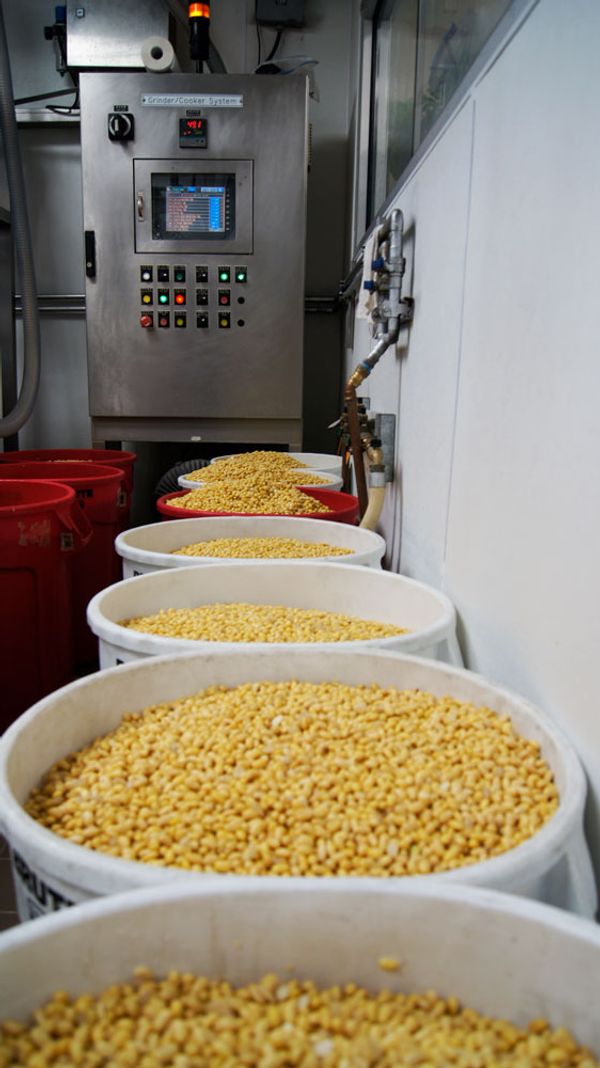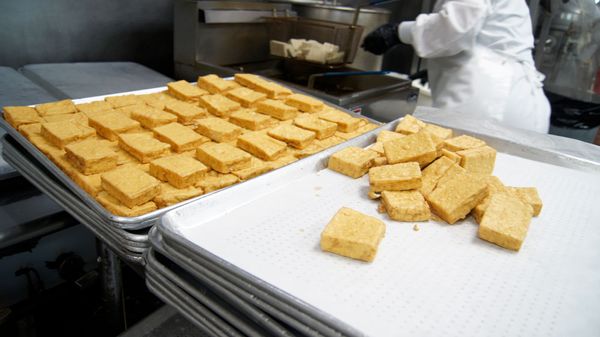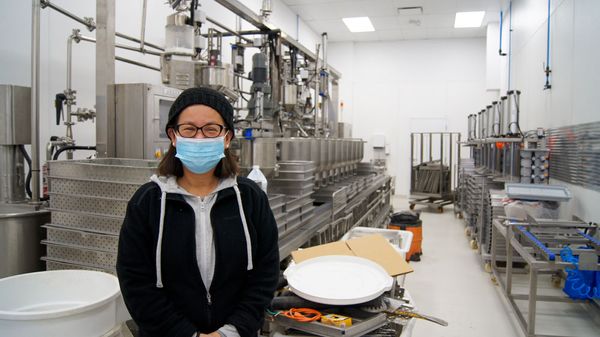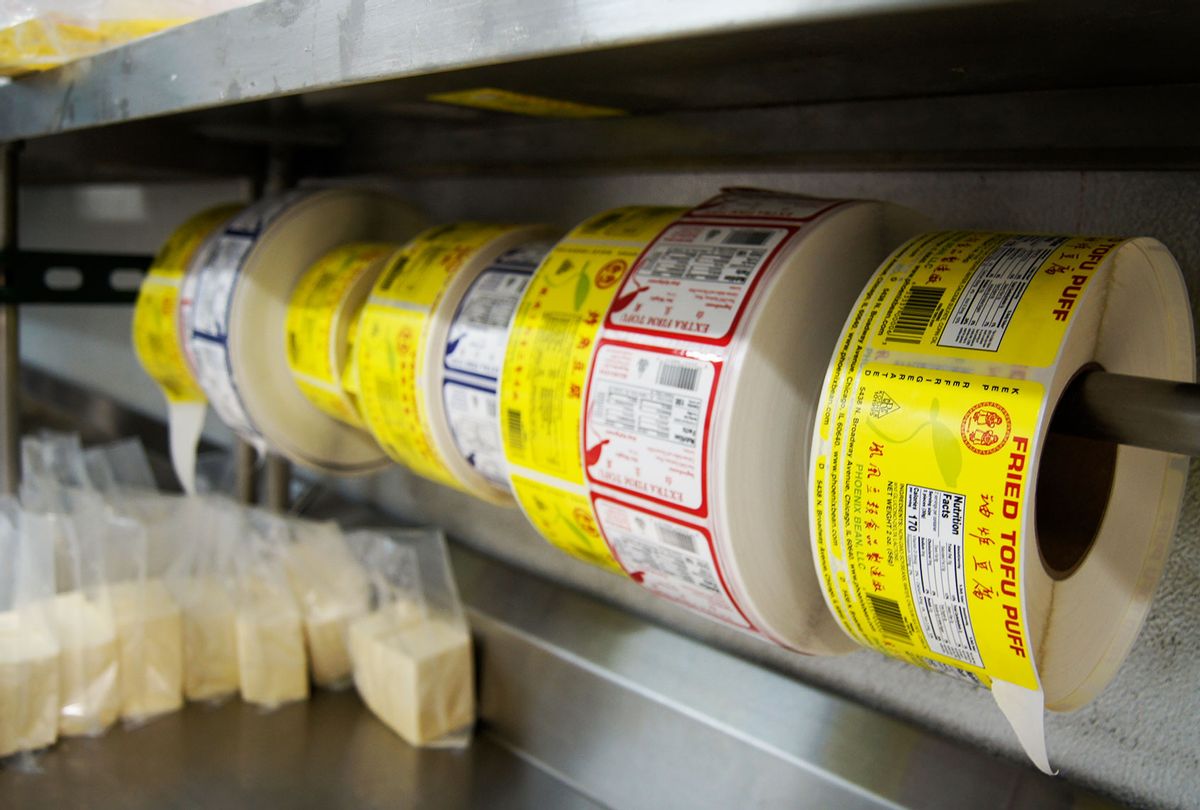Jenny Yang presses a quarter-sized chunk of tofu, still hot from the production line, into my gloved hand. Around us, workers in hair nets and slip-on booties navigate the steamy industrial kitchen — a stark contrast to the dry Chicago winter wind whipping outside — as they grind and boil soybeans, eventually turning the resulting milk into thick, pristine slabs of ivory tofu.
She motions for me to pop the cube in my mouth. I do, expecting it to taste of . . . well, nothingness and maybe a whisper of edamame. Instead, it's silky, clean, subtly earthy, sweet and a little nutty. This, I realize, is what tofu is supposed to taste like.
"Different, right?" Yang says with a wry smile.
RELATED: A 4-ingredient marinade for sheet pan tofu that gets dinner on the table in no time
The first time I purchased tofu was in high school. At the time, I was going through a pretty dedicated vegetarian stretch. Armed with a ratty copy of "Vegetarian Epicure" and scanned pages from "Living Vegetarian for Dummies," I asked my mom to take me to the local health food store to stock up. She gamely wandered the aisles — which smelled, in a turn towards caricature, like patchouli incense — and packed a basket of overpriced ingredients that we could have gotten at the Kroger down the block.
We turned a corner and were faced with a refrigerated wall of tofu. "You're going to need protein," she said, tossing a block into the basket. Neither of us had any idea what to do with it. Once we got home, I stripped the film off the plastic tofu container and turned it over onto the countertop. It was off-white, gelatinous and tasted a bit like wet cardboard when I sliced off a strip.
 Soy beans (Stephen Pate)
Soy beans (Stephen Pate)
My dad joked that it would probably taste better grilled (and little did I know that he was right!). After a few days of watching the tofu jiggle every time I opened the refrigerator, I mixed it into an ill-conceived smoothie. I didn't realize there was a difference between firm and soft tofu.
I wouldn't try tofu again for a few years, when I finally had it properly prepared in a vibrant lemongrass curry at a Vietnamese restaurant. My opinion then was that it was something that took flavor beautifully — but had little flavor itself.
Yang's tofu — which is sold under the brand names Jenny's Tofu and Phoenix Bean — is different because it's small-batch, which enables her and her team to take extra care with their product. The soybeans Yang uses come from regional farms, the majority of which are in Illinois. Her tofu is free from both additives and preservatives.
It's also made from the rich, creamy soy milk that her company produces and sells. In fact, it's the same soy milk that Yang bought before she purchased the small Phoenix Bean factory back in 2007, becoming the company's third owner.
"I lived two blocks away and would bring my daughter to the park down the block," Yang recalls. "I walked by and saw a sign in the window that said there was something about 'soybeans' inside. So, I poke my head in, and it smells really good. I remember the screen door was wide open, and the minute I walked in, I saw that the staff were packaging the tofu right there."
Yang walked in and immediately placed an order. It became a weekly ritual for her and her daughter, who are both lactose intolerant. That ritual continued for five years.
"It was just so fresh," she adds. "It was like I hit the jackpot."
One day, she walked by and noticed that production had halted; the owner was thinking about closing up shop. She joked with the staff about how they couldn't close because she relied on them for her weekly fresh soy products.
 Blocks of crispy tofu (Stephen Pate)"They then start joking, 'So, you want to take it over?'" she says.
Blocks of crispy tofu (Stephen Pate)"They then start joking, 'So, you want to take it over?'" she says.
That joke very quickly turned into reality. By that time, Yang had spent decades working in corporate positions for a major airline, the Chicago Chinatown Chamber of Commerce and Sara Lee. The grind of frequent travel and daily three-hour commutes to and from an office park in the Illinois suburbs were wearing on her. She spoke with her family, and soon she became the proud owner of a miniature tofu plant in a Vietnamese enclave in the city's Edgewater neighborhood.
After a few years of continuing to process and sell out of that space, however, Yang was faced with a big decision.
"Do we stay as a mom and pop store for the Asian community?" she recalls. "Or do we step out?"
Deciding to expand their market reach, Yang and her staff began toting their products to farmers' markets. At that point, they had 18 different varieties of tofu — ranging from extra-soft to turmeric-laced — which they would spread out on a large foldable table. Initially, there were growing pains.
"I felt like sometimes people would walk away from our table," Yang says with a laugh. "Sometimes they would ask, 'Oh, what kind of cheese are you selling?'"
 Owner Jenny Yang in her new, under-construction factory (Stephen Pate)
Owner Jenny Yang in her new, under-construction factory (Stephen Pate)
But they persevered.
In a particularly Chicago move, Yang teamed up with a local pizzeria and would set out sample slices of pizza topped with tofu. It was enough to get people to line up. Eventually, those lines would round the block.
Yang is now in the process of expanding her tofu micro-empire to an even wider audience. She has purchased two additional buildings on the same block as the original Phoenix Bean factory. One will operate as a storefront for the company's prepared tofu salads, packaged items and soy milks, while the other will serve as an updated processing facility.
It's necessary as Jenny's Tofu expands into regional vendors like Mariano's and Whole Foods — a welcome, though challenging development. Many supermarkets want tofu that is shelf-stable for up to 90 days, which flies in the face of Yang's fresh ethos.
RELATED: The best deep dish pizza is not from Chicago
She doesn't like her products to be frozen for shipment, as doing so would change the texture of the fresh tofu. This limits where her products can be made available.
"That was a tough process to navigate," she says.
It's a sacrifice she's willing to make to uphold the quality of the product, especially since there are a multitude of fresh tofu makers across the U.S. Heiwa Tofu is a small family business in Rockport, Maine; Meiji is made in Gardena, Calif.; Ota Tofu is a favorite in Portland; and Roots produces fresh tofu in Louisville, Ky.
So, the next time you're planning to buy a pack of tofu, consider checking out who makes it fresh in your area. The higher quality is worth it, whether you plan to enjoy it raw topped with a scallion-ginger sauce or whipped into mapo tofu. And if you ever find yourself in Chicago, poke your head into one of Yang's shops. The screen door will be open, and they're still selling fresh tofu to passersby — just like the old days.
Read more:



Shares